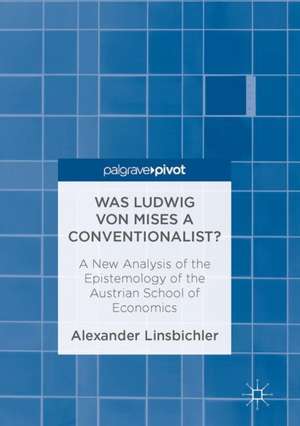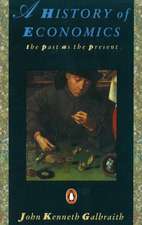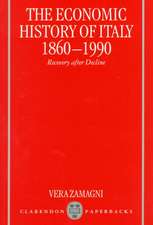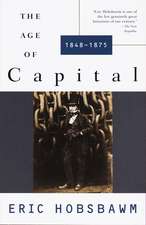Was Ludwig von Mises a Conventionalist?: A New Analysis of the Epistemology of the Austrian School of Economics
Autor Alexander Linsbichleren Limba Engleză Hardback – 26 iun 2017
| Toate formatele și edițiile | Preț | Express |
|---|---|---|
| Paperback (1) | 445.49 lei 6-8 săpt. | |
| Springer International Publishing – 28 iul 2018 | 445.49 lei 6-8 săpt. | |
| Hardback (1) | 451.65 lei 6-8 săpt. | |
| Springer International Publishing – 26 iun 2017 | 451.65 lei 6-8 săpt. |
Preț: 451.65 lei
Nou
Puncte Express: 677
Preț estimativ în valută:
86.43€ • 90.65$ • 71.95£
86.43€ • 90.65$ • 71.95£
Carte tipărită la comandă
Livrare economică 01-15 aprilie
Preluare comenzi: 021 569.72.76
Specificații
ISBN-13: 9783319461694
ISBN-10: 3319461699
Pagini: 139
Ilustrații: IX, 151 p.
Dimensiuni: 148 x 210 mm
Greutate: 0.35 kg
Ediția:1st ed. 2017
Editura: Springer International Publishing
Colecția Palgrave Macmillan
Locul publicării:Cham, Switzerland
ISBN-10: 3319461699
Pagini: 139
Ilustrații: IX, 151 p.
Dimensiuni: 148 x 210 mm
Greutate: 0.35 kg
Ediția:1st ed. 2017
Editura: Springer International Publishing
Colecția Palgrave Macmillan
Locul publicării:Cham, Switzerland
Cuprins
1. Introduction: The Austrian School of Economics between the Tea Party Movement and Academia.- 2. Mises and the Problem of Induction.- 3. Final Destination relativistic Historicism?.- 4. Praxeology as an Alleged Solution of the Problem of Induction.- 5. A Classification Scheme for Epistemological Positions.- 6. A Conventionalist Interpretation of Mises' Justification of the Fundamental Axiom.- 7. Praxeology as a conventionalist Research Program.- 8. Essentialism in the Austrian School.- 9. Recapitulation and Final Thoughts.
Recenzii
“In this book, Linsbichler provides a deliberate analysis of a number of Mises’ unsophisticated texts through a method Linsbichler calls rational reconstruction. Through this approach, Linsbichler appears to succeed in shedding new light on Mises’ epistemology.” (Natsuka Tokumaru, History of Economic Ideas, Vol. 26 (2), 2018)
Notă biografică
Alexander Linsbichler is a Fellow and Lecturer at the University of Vienna, Austria, where he previously studied mathematics, mathematical logic and foundations, and philosophy of science. His main areas of expertise are the history and philosophy of science, mathematical philosophy, and the Austrian School of economics. His current research project is dedicated to the multi-faceted relation between the Austrian School and logical empiricism.
Textul de pe ultima copertă
Linsbichler’s erudite new book is not only an invitation for Austrian economists to reconsider their Misesian methodological foundations, but more importantly an attempt to bridge the methodological gap between the Austrian School and mainstream economics. His charitable reading of Mises provides the basis for an original conventionalist interpretation of Mises’ methodology, but it is most of all his anti-dogmatism, methodological openness and call for intellectual humility that stand out.
—Erwin Dekker, Assistant Professor of Cultural Economics (Erasmus University Rotterdam)
This book proposes new solutions to interpretational problems of Mises‘ methodological position. It also offers a lucid and scholarly introduction to some important problems of the logic of science. Specialists and general readers alike will profit much from reading that book.
—Karl Milford, Associate Professor in History of Economic Thought and Philosophy of Economics (University of Vienna)
This innovative book challenges the mainstream reading of Ludwig von Mises as a contested “a priori” proponent of the Austrian School of economics. It offers new insights to Mises’ methodology and epistemology by interpreting his praxeology as conventionalist. In doing so the author opens novel perspectives for contextualizing Ludwig von Mises’ work in the history of the Austrian School and the long term “Methodenstreit” since the 19th century.
—Friedrich Stadler, Professor for History and Philosophy of Science (University of Vienna), Head and Director of the Institute Vienna Circle, President of the Austrian Ludwig Wittgenstein Society
This book presents a concise introduction to the epistemology and methodology of the Austrian School of economics as defended by Ludwig von Mises. The author provides an innovative interpretation of Mises’ arguments in favour of the a priori truth of praxeology, thereceived view of which contributed to the academic marginalization of the Austrian School. The study puts forward a unique argument that Mises – perhaps unintentionally – defends a form of conventionalism. Chapters in the book include detailed discussions of individualism, historicism, epistemological positions, and essentialism. The author goes on to discuss Mises’ justifi cation of the fundamental axiom and proposes a conventionalist interpretation. By presenting praxeology as a conventionalist research programme, the author aims at reinvigorating the interaction between the Austrian School, mainstream economics, and the philosophy of science. This comprehensive reconstruction is suitable for economists interested in the history and philosophy of their discipline, as well as for philosophers of science.
—Erwin Dekker, Assistant Professor of Cultural Economics (Erasmus University Rotterdam)
This book proposes new solutions to interpretational problems of Mises‘ methodological position. It also offers a lucid and scholarly introduction to some important problems of the logic of science. Specialists and general readers alike will profit much from reading that book.
—Karl Milford, Associate Professor in History of Economic Thought and Philosophy of Economics (University of Vienna)
This innovative book challenges the mainstream reading of Ludwig von Mises as a contested “a priori” proponent of the Austrian School of economics. It offers new insights to Mises’ methodology and epistemology by interpreting his praxeology as conventionalist. In doing so the author opens novel perspectives for contextualizing Ludwig von Mises’ work in the history of the Austrian School and the long term “Methodenstreit” since the 19th century.
—Friedrich Stadler, Professor for History and Philosophy of Science (University of Vienna), Head and Director of the Institute Vienna Circle, President of the Austrian Ludwig Wittgenstein Society
This book presents a concise introduction to the epistemology and methodology of the Austrian School of economics as defended by Ludwig von Mises. The author provides an innovative interpretation of Mises’ arguments in favour of the a priori truth of praxeology, thereceived view of which contributed to the academic marginalization of the Austrian School. The study puts forward a unique argument that Mises – perhaps unintentionally – defends a form of conventionalism. Chapters in the book include detailed discussions of individualism, historicism, epistemological positions, and essentialism. The author goes on to discuss Mises’ justifi cation of the fundamental axiom and proposes a conventionalist interpretation. By presenting praxeology as a conventionalist research programme, the author aims at reinvigorating the interaction between the Austrian School, mainstream economics, and the philosophy of science. This comprehensive reconstruction is suitable for economists interested in the history and philosophy of their discipline, as well as for philosophers of science.
Caracteristici
Re-examines praxeology, the methodology of the Austrian School of economics Presents the unique argument that Mises defended a form of conventionalism Offers a conventionalist reading which renders the Austrian School more accessible for mainstream economists















